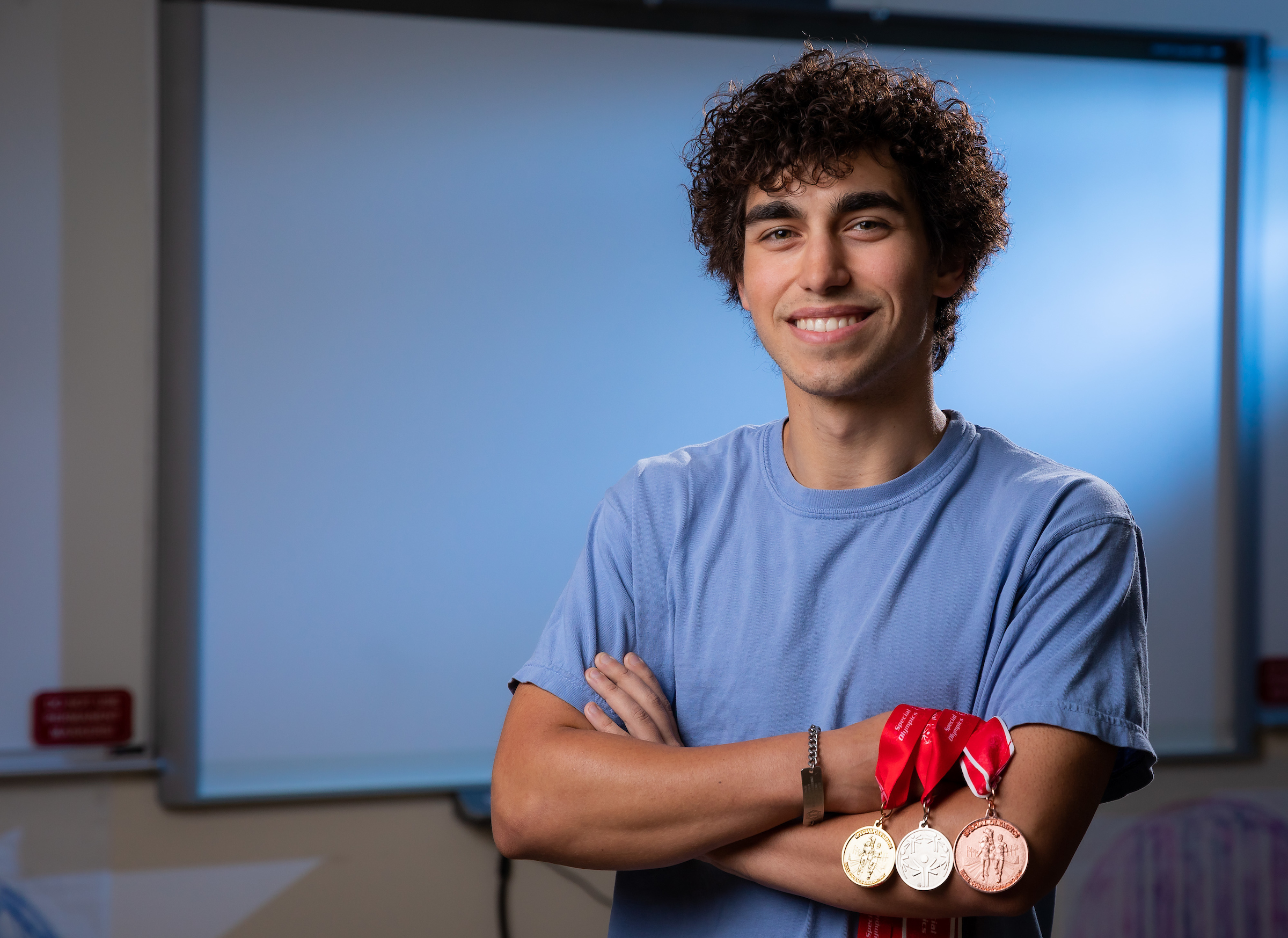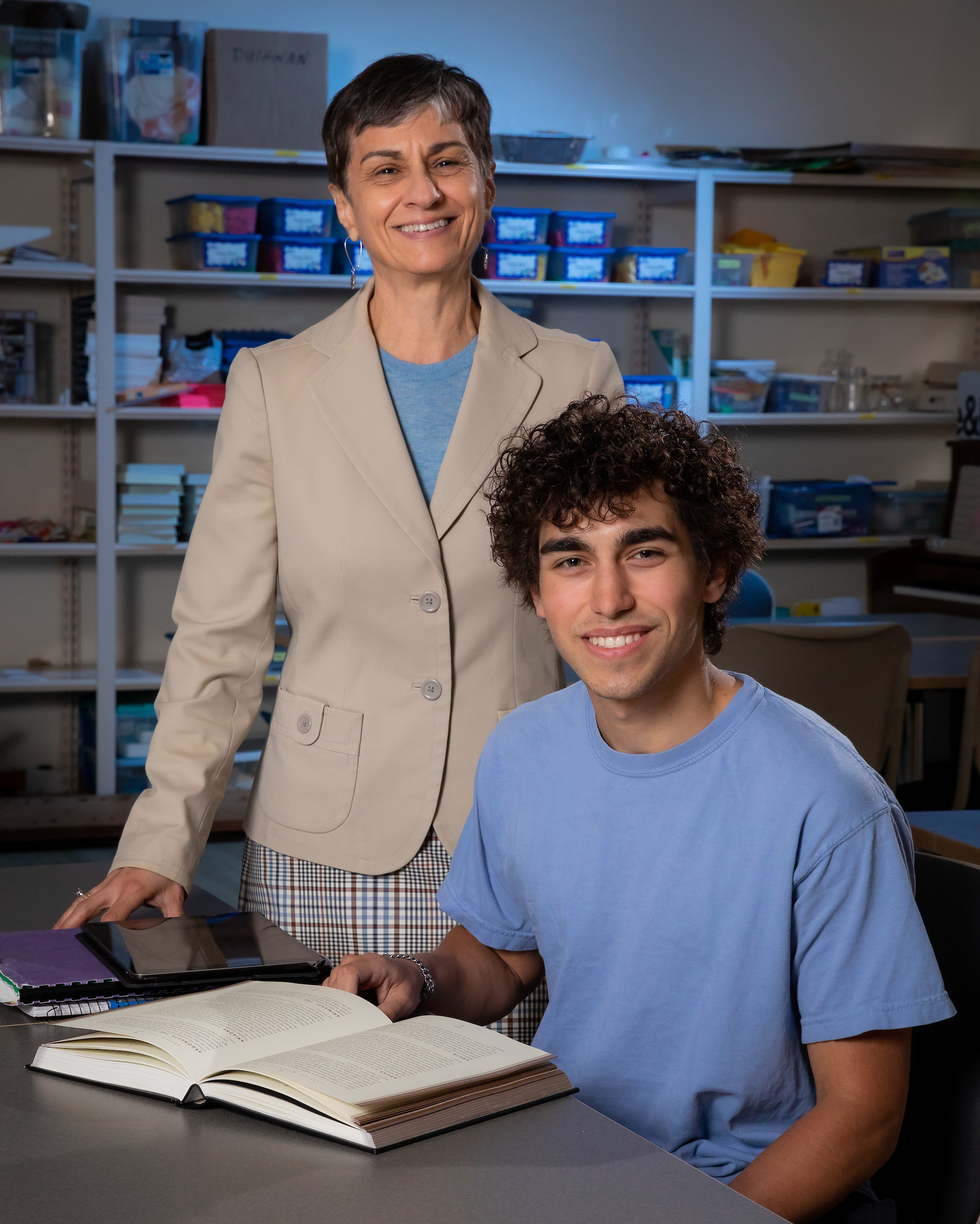 College of Education student Alex Singh won six medals at March's Special Olympics district competition, thus qualifying him for the Illinois Special Olympics Summer Games June 9-11. (DePaul University/Jeff Carrion)
College of Education student Alex Singh won six medals at March's Special Olympics district competition, thus qualifying him for the Illinois Special Olympics Summer Games June 9-11. (DePaul University/Jeff Carrion)College of Education student Alex Singh likes pressure. The pressure of his body contacting a trampoline helped calm him down as a child, when he was beginning to understand his autism. That same pressure led him to gymnastics, where the routine and full-body movements gave him an outlet to “use my muscles and do fun tricks.”
This past March, Singh handled a different type of pressure at the Special Olympics district competition. He won gold in the pommel horse and parallel bars; silver on the high bar, rings and floor routine; and bronze on the vault. With those impressive results, he qualified for June’s Illinois Special Olympics Summer Games, where he hopes to take home additional medals.
Between competitions, Singh practices two hours a day, three days a week while taking classes for his major in special education with minors in Russian and archaeology. An avid lover of Greek mythology, this athlete and advocate for special education is bringing his personal experience into DePaul’s undergraduate and graduate classrooms to help fellow College of Education students better understand autism.
Finding a home at DePaul
 Eva Patrikakou, a professor in the department of Counseling and Special Education, with Alex Singh, a student studying special education in the College of Education. (DePaul University/Jeff Carrion)
Eva Patrikakou, a professor in the department of Counseling and Special Education, with Alex Singh, a student studying special education in the College of Education. (DePaul University/Jeff Carrion)After a year at the University of Arizona, Singh transferred to DePaul for its special education program, housed in the College of Education.
“I like the special education program because they teach how the brain works for someone with exceptionalities and how they learn. Which is interesting to me because I understand how my own brain works,” Singh says. “If someone we are learning about has a hard time focusing, I can relate as I also have a hard time focusing at times. So it’s easier for me to think about what helps them because it might be similar to what helps me.”
Singh’s gift for putting his own experience into words has led him to the front of the classroom on a number of occasions. In spring 2022 and again this May, Singh spoke to both undergraduate and graduate College of Education classes about his experience of being on the autism spectrum, the challenges he has had in school, ways he has learned to navigate those challenges and how his teachers supported him in furthering his learning.
“We know from research that we as humans learn more organically from peers,” says Eva Patrikakou, a professor in the department of Counseling and Special Education, and Singh's advisor and mentor. “Having a fellow DePaul student share their experiences with autism can be very powerful for future educators. As an instructor, I think that’s the perfect synergy; that’s why I invited Alex to present in my classes.”
Living with autism
Autism, or autism spectrum disorder (ASD), refers to a broad range of conditions characterized by challenges with social skills, repetitive behaviors, speech and nonverbal communication, according to the
Centers for Disease Control and Prevention. For Singh, autism shows up in a variety of ways.
Adopted from Russia when he was two years old by his parents Laurie and Rashpal, Singh didn’t speak until he was five. During those early years, Singh was diagnosed with autism, but doctors weren’t sure if he wasn’t speaking due to his level of autism or because of his exclusive exposure to Russian during his first two years before arriving in the U.S.
Speech came in time, but so did other autism symptoms like repetitive behaviors, the need for movement and a hyperfocus—in Singh’s case on Greek mythology. He carries around a book of Greek mythology stories with him and can open up a page at random and explain in depth the story that appears on the page.
“The first book series I ever read was ‘Percy Jackson & the Olympians’ by Rick Riordan in third grade,” Singh says. “Greek mythology calms me down, because I can see all the stories in my head.”
A hyperfocus can come with downsides though, explains Patrikakou. “A hyperfocus for individuals with autism is when they get hung up on something. It can be calming for them. But if for some reason they aren’t able to recall the information they are seeking, or are interrupted from doing the activity, it may trigger a meltdown,” she says.
Singh explains it like this: “If I’m having a meltdown, it’s kind of like a nuclear reactor going off with my brain going haywire. In the moment, my brain doesn’t allow me to think clearly about what I need to help calm me down. It’s only after I’ve calmed down do I realize what could have helped me in the moment.”
“Alex not only expresses his thoughts verbally, but also in writing, and in a really amazing, very eloquent way,” Patrikakou says. “He brings a wealth of real life experience and will be an excellent mentor or coach for our next generation of educators.”
This June, the College of Education and Singh’s family will be cheering him on at the Special Olympics, held June 9-11 in Bloomington-Normal, Illinois. Next year, he hopes to add swimming to his Special Olympics repertoire, something he has loved doing since he was a child and was his first Special Olympics sport.
For Singh, he doesn’t feel the pressure of the competition. “I don’t get nervous, it’s just nice to move my body and participate in activities I’ve loved doing since I was a child.”
Russell Dorn is a manager of news and integrated content in University Communications.